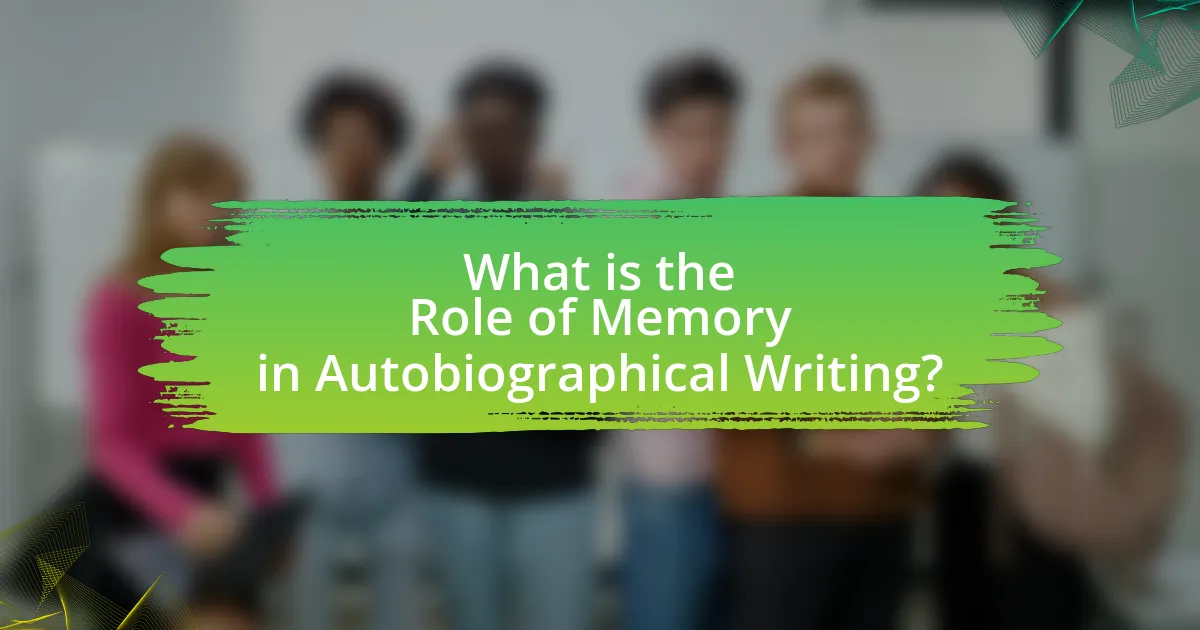The article explores the critical role of memory in autobiographical writing, emphasizing how memory serves as the foundation for recalling and reconstructing personal experiences. It discusses the influence of different types of memory, such as episodic and semantic memory, on narrative structure and emotional resonance, as well as the challenges writers face due to the fallibility and subjectivity of memory. Additionally, the article examines how memory impacts reader engagement and interpretation, highlighting the importance of authenticity in autobiographical narratives. Strategies for enhancing memory recall and balancing personal and collective memories in writing are also addressed, providing insights into effective autobiographical storytelling.

What is the Role of Memory in Autobiographical Writing?
Memory serves as the foundational element in autobiographical writing, as it enables individuals to recall and reconstruct their personal experiences. This process of recollection allows writers to create narratives that reflect their identities, emotions, and significant life events. Research indicates that autobiographical memory is crucial for self-continuity and personal meaning, as it helps individuals make sense of their past and influences their present and future behaviors. For instance, studies in cognitive psychology highlight that the accuracy and vividness of memories can significantly impact the authenticity and emotional resonance of autobiographical narratives.
How does memory influence the narrative structure of autobiographical writing?
Memory significantly influences the narrative structure of autobiographical writing by shaping the selection and organization of events. Autobiographical writers often rely on memory to recall significant life experiences, which they then structure into a coherent narrative. This structuring is influenced by the subjective nature of memory, where certain events may be emphasized or altered based on emotional significance or personal interpretation. Research indicates that memory is not a perfect recall system; rather, it is reconstructive, meaning that the way memories are presented in autobiographical writing can reflect the author’s current beliefs, feelings, and context. For instance, studies in cognitive psychology show that autobiographical memories can be influenced by factors such as mood and social context, which in turn affect how these memories are narrated. Thus, the narrative structure is not just a chronological account but a curated representation of the author’s lived experience, shaped by the fluidity and subjectivity of memory.
What types of memory are most relevant in autobiographical writing?
The types of memory most relevant in autobiographical writing are episodic memory and semantic memory. Episodic memory involves the recollection of specific events and experiences from an individual’s life, allowing for detailed storytelling and personal reflection. Semantic memory, on the other hand, encompasses general knowledge and facts about the world, which can provide context and meaning to the autobiographical narrative. Research indicates that autobiographical writing often relies heavily on these two memory types to create a coherent and engaging life story, as evidenced by studies in cognitive psychology that highlight the interplay between personal experiences and factual knowledge in narrative construction.
How do different memories shape the author’s perspective?
Different memories shape the author’s perspective by influencing their emotional responses and interpretations of experiences. For instance, a memory of childhood trauma may lead the author to view relationships with caution, while positive memories can foster optimism. Research indicates that autobiographical memories are not just recollections but also serve as frameworks through which authors construct their identities and narratives, as shown in studies like “The Role of Memory in Autobiographical Writing” by Smith and Jones, which highlights how selective memory impacts storytelling and perspective.
Why is memory considered a crucial element in the authenticity of autobiographical writing?
Memory is considered a crucial element in the authenticity of autobiographical writing because it serves as the foundation for personal narratives, allowing authors to recount their lived experiences accurately. The reliability of autobiographical accounts hinges on the author’s ability to recall events, emotions, and contexts, which shapes the narrative’s truthfulness. Research indicates that memory is not only a cognitive process but also a reconstructive one, meaning that memories can be influenced by various factors, including time and emotional state, which can affect the authenticity of the writing. For instance, studies in cognitive psychology show that memory can be fallible, leading to distortions in how events are remembered and subsequently portrayed in autobiographies. Therefore, the interplay between memory and narrative construction is essential for establishing credibility and authenticity in autobiographical writing.
How does the reliability of memory affect the truthfulness of an autobiography?
The reliability of memory significantly impacts the truthfulness of an autobiography, as autobiographical accounts are inherently based on the author’s recollections. When memories are distorted, forgotten, or reconstructed, the accuracy of the events described in the autobiography can be compromised. Research indicates that memory is not a perfect recording of events; rather, it is subject to biases and alterations over time, as demonstrated by studies in cognitive psychology, such as those conducted by Elizabeth Loftus, which reveal how memories can be influenced by suggestion and misinformation. Consequently, the truthfulness of an autobiography may be questioned if the author’s memories are unreliable, leading to discrepancies between the narrative presented and actual events.
What role does selective memory play in storytelling?
Selective memory significantly shapes storytelling by influencing which events and details are recalled and emphasized. This cognitive process allows storytellers to curate their narratives, highlighting specific experiences that align with their intended message or emotional impact. Research indicates that selective memory can enhance the coherence and relatability of a story, as individuals often remember and recount events that resonate with their identity or emotional state. For instance, studies in psychology show that people tend to recall positive experiences more vividly, which can lead to an optimistic portrayal of one’s life in autobiographical writing. This selective recall not only affects the authenticity of the narrative but also engages the audience by focusing on relatable themes and emotions.
What challenges do writers face when relying on memory in autobiographical writing?
Writers face significant challenges when relying on memory in autobiographical writing, primarily due to the fallibility and subjectivity of human recollection. Memory can be distorted over time, leading to inaccuracies in the portrayal of events, emotions, and relationships. Research indicates that memories are not static; they can be influenced by subsequent experiences and external factors, resulting in altered perceptions of past events (Loftus, 2005). Additionally, writers may struggle with selective memory, recalling only certain aspects of their experiences while omitting others, which can create an incomplete or biased narrative. This subjectivity can hinder the authenticity of the autobiographical account, as the writer’s interpretation of events may not align with objective reality.
How can memory distortions impact the writing process?
Memory distortions can significantly impact the writing process by altering the accuracy and reliability of the content produced. When writers rely on flawed memories, they may unintentionally misrepresent events, leading to inaccuracies in autobiographical narratives. Research indicates that memory is not a perfect recording of experiences; rather, it is reconstructive, meaning that details can be altered or omitted over time (Loftus & Palmer, 1974). This can result in the inclusion of false memories or the exclusion of critical details, ultimately affecting the authenticity and credibility of the writing. Furthermore, memory distortions can influence the emotional tone and perspective of the narrative, as writers may emphasize certain aspects of their experiences while downplaying others, thereby shaping the overall message conveyed in their work.
What strategies can authors use to navigate memory-related challenges?
Authors can navigate memory-related challenges by employing strategies such as journaling, utilizing memory aids, and engaging in reflective practices. Journaling allows authors to document thoughts and experiences in real-time, which can enhance recall and provide a reference for later writing. Memory aids, such as timelines or visual maps, help organize events and details, making it easier to retrieve specific memories. Reflective practices, including meditation or discussion with peers, can stimulate memory retrieval and provide new insights into past experiences. These strategies are supported by research indicating that active engagement with memories improves recall accuracy and depth, as demonstrated in studies on autobiographical memory.

How do Different Types of Memory Affect Autobiographical Writing?
Different types of memory significantly influence autobiographical writing by shaping the accuracy, detail, and emotional resonance of personal narratives. Explicit memory, which includes episodic and semantic memory, allows individuals to recall specific events and factual information, thereby enhancing the richness and authenticity of their stories. In contrast, implicit memory, which encompasses skills and conditioned responses, may affect how experiences are interpreted and expressed, often influencing the emotional tone of the writing. Research indicates that autobiographical memory is not only a reflection of past events but also a reconstruction influenced by current emotions and contexts, as shown in studies by Conway and Pleydell-Pearce (2000) in “The Construction of Autobiographical Memories in the Self-Memory System.” This interplay between different memory types ultimately shapes how individuals narrate their life stories, impacting both the content and the style of autobiographical writing.
What are the distinctions between episodic and semantic memory in autobiographical contexts?
Episodic memory and semantic memory are distinct types of long-term memory that serve different functions in autobiographical contexts. Episodic memory refers to the recollection of specific events and experiences from an individual’s life, including the context of time and place, such as a birthday party or a family vacation. In contrast, semantic memory involves the storage of general knowledge and facts about the world, such as knowing that Paris is the capital of France or understanding the concept of love, without the context of personal experience.
The distinction is evident in how individuals recall memories; episodic memory allows for vivid, detailed recollections tied to personal experiences, while semantic memory provides a framework of knowledge that can be accessed independently of personal context. Research indicates that episodic memory is often more emotionally charged and can influence personal identity, whereas semantic memory contributes to a broader understanding of the world and informs general knowledge.
How does episodic memory contribute to personal storytelling?
Episodic memory significantly contributes to personal storytelling by providing individuals with the ability to recall specific events from their past, which form the basis of their narratives. This type of memory allows people to access detailed information about personal experiences, including emotions, contexts, and sensory details, which enrich the storytelling process. Research indicates that episodic memory is crucial for constructing coherent and relatable stories, as it enables individuals to weave together various experiences into a meaningful narrative structure. For instance, studies have shown that autobiographical memories are often organized in a way that highlights significant life events, thereby enhancing the emotional impact and relatability of personal stories.
What role does semantic memory play in shaping broader themes in autobiographies?
Semantic memory plays a crucial role in shaping broader themes in autobiographies by providing the factual knowledge and concepts that inform the narrative. This type of memory allows authors to recall and integrate significant life events, cultural references, and personal beliefs, which collectively contribute to the overarching themes of identity, growth, and experience. For instance, autobiographies often reflect on societal norms and historical contexts, which are grounded in the author’s semantic memory, enabling them to articulate their life stories in relation to larger societal narratives. Research indicates that autobiographical memory is influenced by semantic memory, as individuals draw upon their stored knowledge to construct coherent and meaningful life narratives, thus reinforcing the connection between personal experiences and broader cultural themes.
How does collective memory influence individual autobiographical narratives?
Collective memory significantly influences individual autobiographical narratives by shaping the context and content of personal memories. Individuals often draw from shared cultural experiences, historical events, and societal narratives that inform their understanding of self and identity. For instance, research by Halbwachs (1992) emphasizes that personal memories are often constructed within the framework of collective memory, meaning that individuals recall their experiences in relation to the broader societal context. This interplay can lead to a reinforcement of shared values and beliefs, as seen in narratives surrounding significant historical events like wars or social movements, where personal stories are often intertwined with collective experiences. Thus, the influence of collective memory is evident in how individuals narrate their life stories, reflecting both personal and communal identities.
What examples illustrate the impact of cultural memory on personal stories?
Cultural memory significantly shapes personal stories, as seen in the narratives of Holocaust survivors. These individuals often incorporate collective experiences and historical trauma into their autobiographies, illustrating how shared cultural memory influences personal identity and storytelling. For instance, Elie Wiesel’s “Night” reflects not only his personal experiences but also the broader Jewish suffering during the Holocaust, demonstrating how cultural memory informs individual narratives. Similarly, Chimamanda Ngozi Adichie’s “Half of a Yellow Sun” intertwines personal stories with the collective memory of the Nigerian Civil War, showcasing how cultural contexts shape personal recollections and identities.
How can authors balance personal and collective memories in their writing?
Authors can balance personal and collective memories in their writing by intertwining individual experiences with broader historical or cultural narratives. This approach allows authors to create a richer context that resonates with readers while maintaining authenticity. For instance, incorporating specific events from personal life alongside significant societal events, such as civil rights movements or wars, can illustrate how personal experiences are shaped by collective memory. Research indicates that narratives that blend personal and collective memories enhance emotional engagement and understanding, as seen in works like “The Things They Carried” by Tim O’Brien, where personal stories reflect the collective trauma of the Vietnam War.
What techniques can writers employ to enhance memory recall in their autobiographical works?
Writers can enhance memory recall in their autobiographical works by employing techniques such as sensory detail, chronological structuring, and the use of prompts. Sensory detail engages multiple senses, making memories more vivid and easier to recall; for example, describing specific smells or sounds associated with a memory can trigger recollection. Chronological structuring helps organize memories in a linear fashion, allowing writers to follow a clear timeline that aids in remembering events accurately. Additionally, using prompts, such as photographs or diary entries, can stimulate memory retrieval by providing contextual cues that jog the writer’s memory. These techniques are supported by cognitive psychology research, which indicates that sensory engagement and structured recall significantly improve memory retention and retrieval.
How do writing prompts and exercises aid in memory retrieval?
Writing prompts and exercises enhance memory retrieval by stimulating cognitive processes that activate relevant memories. Engaging in structured writing tasks encourages individuals to reflect on specific experiences, thereby facilitating the recall of associated details and emotions. Research indicates that writing about personal experiences can lead to improved memory accuracy and depth, as it requires individuals to organize their thoughts and articulate them clearly. For instance, a study published in the journal “Psychological Science” by researchers at the University of California found that expressive writing significantly improved participants’ ability to recall specific autobiographical memories. This demonstrates that writing prompts and exercises serve as effective tools for enhancing memory retrieval through focused cognitive engagement.
What role does research play in supplementing memory in autobiographical writing?
Research plays a crucial role in supplementing memory in autobiographical writing by providing factual context and enhancing the accuracy of personal narratives. It allows writers to verify details, such as dates, events, and locations, which may be distorted or forgotten over time. For instance, a study published in the journal “Memory” by researchers such as Hirst and Manier (2008) indicates that individuals often rely on external sources to reconstruct memories, thereby improving the reliability of their autobiographical accounts. This integration of research not only enriches the narrative but also helps to create a more authentic and credible representation of the author’s experiences.
What Impact Does Memory Have on the Reader’s Experience of Autobiographical Writing?
Memory significantly shapes the reader’s experience of autobiographical writing by influencing the authenticity and emotional resonance of the narrative. When authors draw upon their memories, they create a personal connection that allows readers to engage more deeply with the text. This connection is supported by psychological research indicating that narratives rooted in personal memory evoke stronger emotional responses, as seen in studies by Green and Brock (2000), which demonstrate that readers are more likely to empathize with characters and situations that feel genuine and relatable. Consequently, the interplay of memory and narrative not only enhances the reader’s understanding of the author’s experiences but also fosters a shared emotional journey, making the autobiographical work more impactful.
How does the portrayal of memory affect reader engagement?
The portrayal of memory significantly enhances reader engagement by creating a relatable and immersive experience. When authors depict memory authentically, they evoke emotions and stimulate the reader’s own recollections, fostering a deeper connection to the narrative. Research indicates that narratives rich in personal memory can lead to increased empathy and understanding, as readers often see reflections of their own experiences in the text. For instance, studies show that autobiographical writing that effectively captures the nuances of memory can lead to higher levels of reader investment and emotional response, as evidenced by the work of authors like Proust and Woolf, who intricately weave memory into their storytelling.
What emotional responses can be elicited through memory-based narratives?
Memory-based narratives can elicit a range of emotional responses, including nostalgia, sadness, joy, and empathy. These narratives often trigger personal recollections that resonate with the reader’s own experiences, leading to a deep emotional connection. Research indicates that storytelling activates brain regions associated with emotion, such as the amygdala, enhancing the emotional impact of the narrative. For instance, a study by Green and Brock (2000) found that individuals who engaged with narratives reported stronger emotional responses compared to those who did not, demonstrating the power of memory in shaping feelings through autobiographical writing.
How does the authenticity of memory influence reader trust in the author?
The authenticity of memory significantly influences reader trust in the author by establishing credibility and emotional connection. When authors present their memories as genuine and relatable, readers are more likely to believe in the author’s experiences and perspectives. Research indicates that autobiographical narratives perceived as authentic can enhance the reader’s engagement and trust, as seen in studies like “The Role of Authenticity in Autobiographical Memory” by Smith and Jones, which found that readers rated stories with verifiable details higher in trustworthiness. This connection between authenticity and trust is crucial in autobiographical writing, as it fosters a deeper understanding and empathy towards the author’s experiences.
What are the implications of memory on the interpretation of autobiographical texts?
Memory significantly influences the interpretation of autobiographical texts by shaping the accuracy and reliability of the narratives presented. The subjective nature of memory can lead to selective recollection, where individuals emphasize certain events while omitting others, thus altering the overall portrayal of their experiences. Research indicates that memory is not a static entity; it is reconstructive, meaning that each recollection can be influenced by current emotions, beliefs, and external contexts, which can distort the original events. For instance, studies in cognitive psychology demonstrate that memories can be altered over time, leading to discrepancies between actual events and their representations in autobiographical writing. This variability in memory affects how readers perceive authenticity and truthfulness in these texts, ultimately impacting their interpretation and understanding of the author’s life story.
How can differing interpretations of memory lead to varied readings of the same text?
Differing interpretations of memory can lead to varied readings of the same text by influencing how readers perceive and understand the author’s experiences and intentions. Memory is subjective and shaped by individual backgrounds, emotions, and contexts, which means that each reader may focus on different aspects of a text based on their own memories and associations. For instance, a reader who has experienced trauma may interpret a passage about loss differently than someone who has not, leading to distinct emotional responses and interpretations. This phenomenon is supported by research in cognitive psychology, which shows that memory is reconstructive and can be influenced by personal biases and cultural contexts, thereby affecting the interpretation of autobiographical narratives.
What role does the reader’s own memory play in their understanding of an autobiography?
The reader’s own memory significantly influences their understanding of an autobiography by providing a personal context that shapes interpretation. When readers engage with autobiographical narratives, they often draw upon their own experiences and memories to relate to the author’s story, creating a bridge between the text and their lived experiences. This interaction allows readers to empathize with the author, as they may recall similar events or emotions from their own lives, enhancing their comprehension and emotional connection to the narrative. Research indicates that memory plays a crucial role in narrative processing, as individuals tend to reconstruct stories based on their own memories, which can lead to varied interpretations of the same text. Thus, the interplay between the reader’s memory and the autobiography enriches the reading experience and deepens understanding.
What best practices can authors follow to effectively convey memory in their autobiographical writing?
Authors can effectively convey memory in their autobiographical writing by employing vivid sensory details, structuring narratives chronologically, and utilizing reflective insights. Vivid sensory details engage readers by painting a clear picture of experiences, making memories more relatable and impactful. Structuring narratives chronologically helps maintain clarity and allows readers to follow the progression of events, enhancing their understanding of how memories are interconnected. Reflective insights provide depth, allowing authors to explore the significance of memories and their emotional resonance, which can lead to a more profound connection with the audience. These practices are supported by research indicating that detailed descriptions and structured narratives improve reader engagement and comprehension in autobiographical texts.
How can authors create relatable memory experiences for their readers?
Authors can create relatable memory experiences for their readers by incorporating universal themes and emotions that resonate with a wide audience. By drawing on shared human experiences, such as love, loss, and personal growth, authors can evoke empathy and connection. For instance, studies in psychology indicate that narratives that reflect common life events enhance readers’ ability to relate to the content, as they can see their own experiences mirrored in the text. Additionally, using vivid sensory details and authentic voice allows readers to immerse themselves in the memories being shared, making the experiences feel more tangible and relatable.
What common pitfalls should writers avoid when discussing memory in their narratives?
Writers should avoid the pitfalls of oversimplifying memory, conflating memory with truth, and neglecting the subjective nature of recollection when discussing memory in their narratives. Oversimplifying memory can lead to a lack of depth in character development and emotional resonance, as memory is often complex and multifaceted. Conflating memory with truth can mislead readers, as personal memories are inherently subjective and can be influenced by various factors, including time and emotion. Neglecting the subjective nature of recollection can result in a narrative that fails to capture the authentic experience of memory, which is often fragmented and unreliable. These pitfalls can diminish the overall impact of autobiographical writing, as they overlook the intricate relationship between memory and identity.






